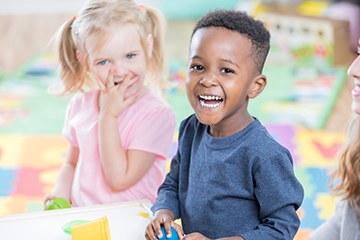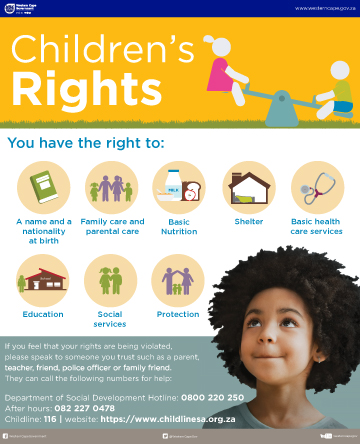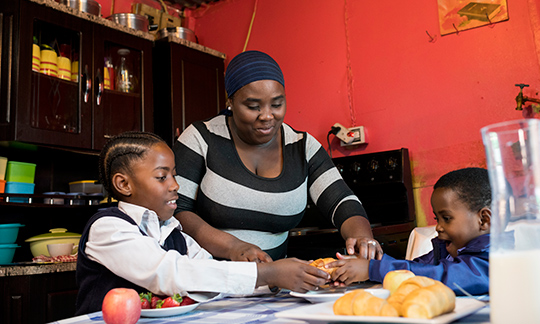Children, know your rights and responsibilities
Children are among the most vulnerable me mbers of society and need special protection.
mbers of society and need special protection.
It's our shared responsibility as parents, families, communities and government to ensure that all of our children are safe from harm and grow up in nurturing environments.
To ensure this, children have special legal rights which are enforced by the state.
What are children’s rights?
Children’s rights are entrenched in Section 28 in the Bill of Rights in the Constitution of South Africa. These rights are in the best interest of all children under the age of 18 years old.
The drafters of our Constitution have made children's rights a priority. When it comes to any matter affecting a child’s well-being, the Constitution states that the best interests of a child are of paramount importance.
Understanding children’s rights
Section 28 of the Bill of Rights, entitled "Children", says:
Every child has the right to:
- A name and a nationality from birth.
- Family care or parental care, or to appropriate alternative care when removed from the family environment.
- Basic nutrition, shelter, basic health care services and social services.
- Be protected from maltreatment, neglect, abuse or degradation.
- Be protected from exploitative labour practices.
- Not be required or permitted to perform work or provide services that are inappropriate for a person of that child's age or risk the child's well-being, education, physical or mental health or spiritual, moral or social development.
- Not be detained except as a measure of last resort, in which case, in addition to the rights a child enjoys under sections 12 and 35, the child may be detained only for the shortest appropriate period of time, and has the right to be kept separately from detained persons over the age of 18 years.
- Be treated in a manner, and kept in conditions, that take account of the child's age and have a legal practitioner assigned to the child by the state, and at state expense, in civil proceedings affecting the child, if substantial injustice would otherwise result.
- Not be used directly in armed conflict, and to be protected in times of armed conflict.
Watch: What are Children's Rights?
With rights come responsibilities
Chapter 2 of our Constitution contains the Bill of Rights which applies to everyone.
Some of these rights apply to children and should be exercised responsibly.
These include:
- The right to family care, love and protection and the responsibility to show love, respect and caring to others especially the elderly.
- The right to a clean environment and the responsibility to take care of their environment by cleaning the space they live in.
- A right to food and the responsibility not to be wasteful.
- A right to good quality education and the responsibility to learn and respect their teachers and peers.
- A right to quality medical care and the responsibility to take care of themselves and protect themselves from irresponsible exposure to diseases such as HIV/Aids.
- A right to protection from exploitation and neglect and the responsibility to report abuse and exploitation.
The Bill of Rights isn't the only instrument the law uses to guard children's rights.

Legislation that provides specific protection for children includes:
- The Child Care Act of 1983 that makes it a criminal offense if a person who’s responsible for caring for a child doesn't provide the child with clothes, housing and medical care.
- The Basic Conditions of Employment Act of 1997 that makes it illegal to employ a child under the age of 15.
- The Domestic Violence Act of 1998, defines different forms of domestic violence and explains how a child can get a protection order against the abuser.
- The Films and Publications Act of 1996, protects children from exploitation in child pornography.
The interests of the children are seen as most important in deciding on custody or access to children.
One example of new legislation passed in response to a Constitutional Court ruling is the Fraser judgment - the Natural Fathers of Children Born out of Wedlock Act of 1997.
It gives natural unmarried fathers, including those whose marriages aren’t recognised by the state, for example, Muslim and Hindu marriages the statutory right to go to court to ask for access, custody or guardianship of their children. The Children's Bill, which went before Parliament in 2003, is meant to replace the Child Care Act of 1983 and provides a holistic approach to the rights of all children.
Help protect our children and report abuse
- Department of Social Development: 0800 220 250
- Childline helpline: 116


